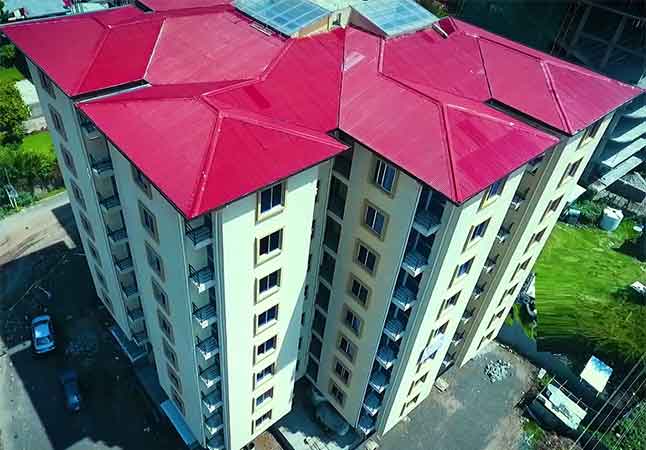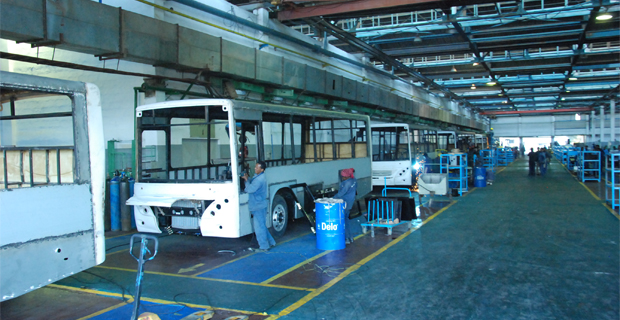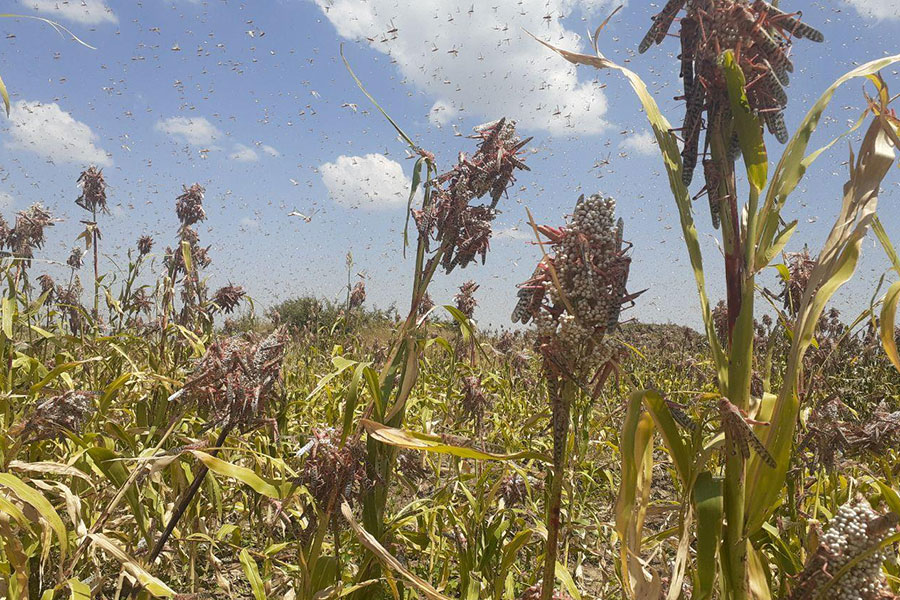
Fortune News | Jul 13,2019
An irrigation project in the Amhara Regional State remains dysfunctional four years after its completion, trouncing the dreams of thousands of smallholder farmers who had hoped the project would help them to double productivity.
Located four kilometres from the Jemma River in the North Shewa Zone, the project was launched in 2015 with an outlay of 67 million Br financed by the regional administration. Construction lasted three years and consumed 15 million Br more than the initial cost projection. The dam was designed to benefit 2,500 farmers in Merhabete Wereda, 183Km north of Addis Abeba, covering 500hct of land. Established in 2001, the state-owned Amhara Design & Supervision Works Enterprise (ADSWE) carried out the design and supervised the project.
Tis Isat Water Works Plc, a grade-one contractor incorporated in 2008 and specialising in drilling water wells, secured the contract to erect the structure with drainage elements, including the main canal and water distribution system. The primary canal is 14Km long. The company is a subsidiary of Gafat Endowment & Organisation for Rehabilitation & Development in Amhara. Its managers claim the project was concluded successfully and transferred the dam's operation to the Wereda administration. However, it has not been operational for the last four years due to sediment deposits blocking the waterways.
The Wereda administration has written letters to the regional government four times over the past three years, urging a solution.
The Wereda officials tabled the issue to the 294-member regional council following the formation of a new regional administration last October. According to Dawit Habtamu, deputy head of the Merhabete Agriculture Development Bureau, no response has been made.
“We haven’t seen any response so far," he told Fortune.
A team from the Enterprise visited the project site last year. It concluded flawed design is not the only factor contributing to the malfunctioning project, according to Yonas Nega, construction team leader of the Enterprise.
"It's also connected with the topography and the frequently changing course of the river," he said.
Sediment deposits are common problems observed in irrigation dams and canals, according to Negash Tessema, a lecturer at the Haromaya University's Water Resource & Irrigation Engineering Department.
"Excessive soil erosion impedes the functioning of many irrigation schemes throughout the country," Negash says.
He observed that several irrigation schemes operate under capacity, while others are abandoned due to excessive sedimentation.
“Although the area's topography contributes, poor and unsuited design is the major problem," said Negash.
According to Yeshalal Abebe, project manager at Tis Isat Water Works Plc, the project was constructed based on the design submitted to the contractor. However, the design was not prepared taking into account the flow of the river and the topography of the surrounding area, according to him.
There are two approaches to designing irrigation dams. Large-scale projects have parameters of the designs chosen by top officials and project financiers, according to the expert. On the other hand, the bottom-up approach uses input from residents knowledgeable about topography and other environmental factors for the design.
“In the absence of sufficient consultation, the design becomes unfitting,” said Negash.
The regional administration has established a committee to explore solutions for the setbacks the Jemma irrigation project suffers. It has proposed two options: using heavy-duty machinery to fill the dam with water from the river or clearing the sediment deposits using construction machinery.
“Due to the conflict in the north, the administration was unable to buy the machinery from abroad,” said Dagenet Fenta (PhD), head of Amhara Irrigation & Lowlands Bureau.
Nonetheless, anything less than a redesign will make it challenging to provide sustainable solutions for the malfunctioning project, says the expert.
Against the backdrop of trading blames, the dysfunctional irrigation is only a disappointment to thousands of smallholder farmers in the area.
Gezu Tadesse, 45, is one of the 1,000 farmers who each surrendered between 0.25 and 0.75ht of land with no compensation, hoping that the irrigation project would help them harvest more often. Gezu gave up half a hectare and now grows teff and sorghum on one hectare to support his family. A father of five children, he was harvesting 10qtl of teff and 25qtl of sorghum each farming cycle before; productivity has dropped by over a third since.
"I was hoping to compensate for the loss by cultivating at least twice a year with the help of the irrigation canal," he said. "I've lost all hope."
On the eastern edge of the Ethiopian highlands, the North Shewa Zone is home to several high peaks, including Mount Abuye Meda at 4,012m above sea level. A little over half a million smallholder farmers like Gezu harvested 13.7 million quintals of grains there during the last Mehir season, on close to half a million hectares of land. Teff, wheat and sorghum are the primary crops cultivated in the area.
Farmers in the area depend heavily on rainfall, with less than five percent of the 4.5 million hectares of farmland in the Amhara Regional State ploughed through irrigation. Close to 310 irrigation projects have been completed since the regional government was first formed in 1995. Small and medium-scale irrigation dams account for around 90pc of the total, and several of these projects remain unfinished. The Jemma irrigation canal is one among a series of small, medium and large-scale irrigation projects undertaken in the Amhara Regional State.
Two weeks ago, a team led by Aisha Mohammed, minister of Irrigation & Lowlands, visited three large-scale irrigation dams under construction in the regional state, including the six billion Birr Megech irrigation project. Under construction for over eight years near Gonder town, Megech irrigation dam has seen 70pc completed last year. Although Prime Minister Abiy Ahmed (PhD) pledged in June last year that the project would be completed in 2021, the project is among half a dozen large-scale irrigation projects behind schedule.
PUBLISHED ON
Apr 09,2022 [ VOL
23 , NO
1145]

Fortune News | Jul 13,2019

Radar | Oct 12,2019

Radar | Nov 26,2022

Radar | Dec 05,2018

Fortune News | May 11,2019

Fortune News | Aug 05,2023

Agenda | Oct 17,2020

Radar | May 18,2019

Fortune News | Mar 06,2021

Editorial | Mar 09,2024

Dec 22 , 2024 . By TIZITA SHEWAFERAW
Charged with transforming colossal state-owned enterprises into modern and competitiv...

Aug 18 , 2024 . By AKSAH ITALO
Although predictable Yonas Zerihun's job in the ride-hailing service is not immune to...

Jul 28 , 2024 . By TIZITA SHEWAFERAW
Unhabitual, perhaps too many, Samuel Gebreyohannes, 38, used to occasionally enjoy a couple of beers at breakfast. However, he recently swit...

Jul 13 , 2024 . By AKSAH ITALO
Investors who rely on tractors, trucks, and field vehicles for commuting, transporting commodities, and f...

Jun 28 , 2025
Meseret Damtie, the assertive auditor general, has never been shy about naming names...

Jun 21 , 2025
A well-worn adage says, “Budget is not destiny, but it is direction.” Examining t...

Jun 14 , 2025
Yet again, the Horn of Africa is bracing for trouble. A region already frayed by wars...

Jun 7 , 2025
Few promises shine brighter in Addis Abeba than the pledge of a roof for every family...